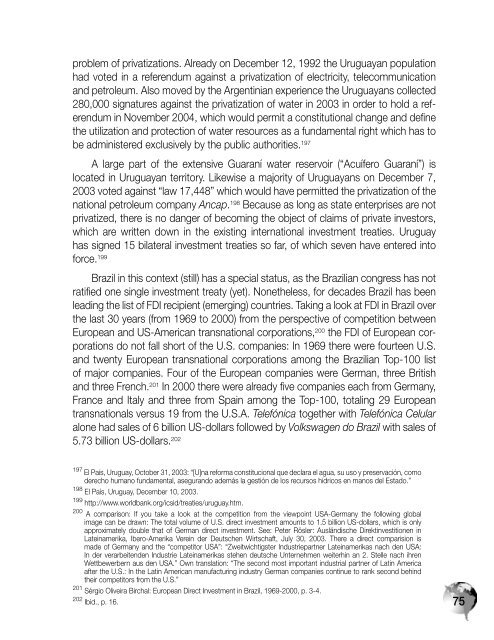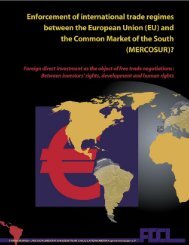(EU) and the Common Market of the South (MERCOSUR)? - FDCL
(EU) and the Common Market of the South (MERCOSUR)? - FDCL
(EU) and the Common Market of the South (MERCOSUR)? - FDCL
You also want an ePaper? Increase the reach of your titles
YUMPU automatically turns print PDFs into web optimized ePapers that Google loves.
problem <strong>of</strong> privatizations. Already on December 12, 1992 <strong>the</strong> Uruguayan population<br />
had voted in a referendum against a privatization <strong>of</strong> electricity, telecommunication<br />
<strong>and</strong> petroleum. Also moved by <strong>the</strong> Argentinian experience <strong>the</strong> Uruguayans collected<br />
280,000 signatures against <strong>the</strong> privatization <strong>of</strong> water in 2003 in order to hold a referendum<br />
in November 2004, which would permit a constitutional change <strong>and</strong> define<br />
<strong>the</strong> utilization <strong>and</strong> protection <strong>of</strong> water resources as a fundamental right which has to<br />
be administered exclusively by <strong>the</strong> public authorities. 197<br />
A large part <strong>of</strong> <strong>the</strong> extensive Guaraní water reservoir (“Acuífero Guaraní”) is<br />
located in Uruguayan territory. Likewise a majority <strong>of</strong> Uruguayans on December 7,<br />
2003 voted against “law 17,448” which would have permitted <strong>the</strong> privatization <strong>of</strong> <strong>the</strong><br />
national petroleum company Ancap. 198 Because as long as state enterprises are not<br />
privatized, <strong>the</strong>re is no danger <strong>of</strong> becoming <strong>the</strong> object <strong>of</strong> claims <strong>of</strong> private investors,<br />
which are written down in <strong>the</strong> existing international investment treaties. Uruguay<br />
has signed 15 bilateral investment treaties so far, <strong>of</strong> which seven have entered into<br />
force. 199<br />
Brazil in this context (still) has a special status, as <strong>the</strong> Brazilian congress has not<br />
ratified one single investment treaty (yet). None<strong>the</strong>less, for decades Brazil has been<br />
leading <strong>the</strong> list <strong>of</strong> FDI recipient (emerging) countries. Taking a look at FDI in Brazil over<br />
<strong>the</strong> last 30 years (from 1969 to 2000) from <strong>the</strong> perspective <strong>of</strong> competition between<br />
European <strong>and</strong> US-American transnational corporations, 200 <strong>the</strong> FDI <strong>of</strong> European corporations<br />
do not fall short <strong>of</strong> <strong>the</strong> U.S. companies: In 1969 <strong>the</strong>re were fourteen U.S.<br />
<strong>and</strong> twenty European transnational corporations among <strong>the</strong> Brazilian Top-100 list<br />
<strong>of</strong> major companies. Four <strong>of</strong> <strong>the</strong> European companies were German, three British<br />
<strong>and</strong> three French. 201 In 2000 <strong>the</strong>re were already five companies each from Germany,<br />
France <strong>and</strong> Italy <strong>and</strong> three from Spain among <strong>the</strong> Top-100, totaling 29 European<br />
transnationals versus 19 from <strong>the</strong> U.S.A. Telefónica toge<strong>the</strong>r with Telefónica Celular<br />
alone had sales <strong>of</strong> 6 billion US-dollars followed by Volkswagen do Brazil with sales <strong>of</strong><br />
5.73 billion US-dollars. 202<br />
197<br />
El País, Uruguay, October 31, 2003: “[U]na reforma constitucional que declara el agua, su uso y preservación, como<br />
derecho humano fundamental, asegur<strong>and</strong>o además la gestión de los recursos hídricos en manos del Estado.”<br />
198<br />
El País, Uruguay, December 10, 2003.<br />
199<br />
http://www.worldbank.org/icsid/treaties/uruguay.htm.<br />
200<br />
A comparison: If you take a look at <strong>the</strong> competition from <strong>the</strong> viewpoint USA-Germany <strong>the</strong> following global<br />
image can be drawn: The total volume <strong>of</strong> U.S. direct investment amounts to 1.5 billion US-dollars, which is only<br />
approximately double that <strong>of</strong> German direct investment. See: Peter Rösler: Ausländische Direktinvestitionen in<br />
Lateinamerika, Ibero-Amerika Verein der Deutschen Wirtschaft, July 30, 2003. There a direct comparision is<br />
made <strong>of</strong> Germany <strong>and</strong> <strong>the</strong> “competitor USA”: “Zweitwichtigster Industriepartner Lateinamerikas nach den USA:<br />
In der verarbeitenden Industrie Lateinamerikas stehen deutsche Unternehmen weiterhin an 2. Stelle nach ihren<br />
Wettbewerbern aus den USA.” Own translation: “The second most important industrial partner <strong>of</strong> Latin America<br />
after <strong>the</strong> U.S.: In <strong>the</strong> Latin American manufacturing industry German companies continue to rank second behind<br />
<strong>the</strong>ir competitors from <strong>the</strong> U.S.”<br />
201<br />
Sérgio Oliveira Birchal: European Direct Investment in Brazil, 1969-2000, p. 3-4.<br />
202 Ibid., p. 16.<br />
75









